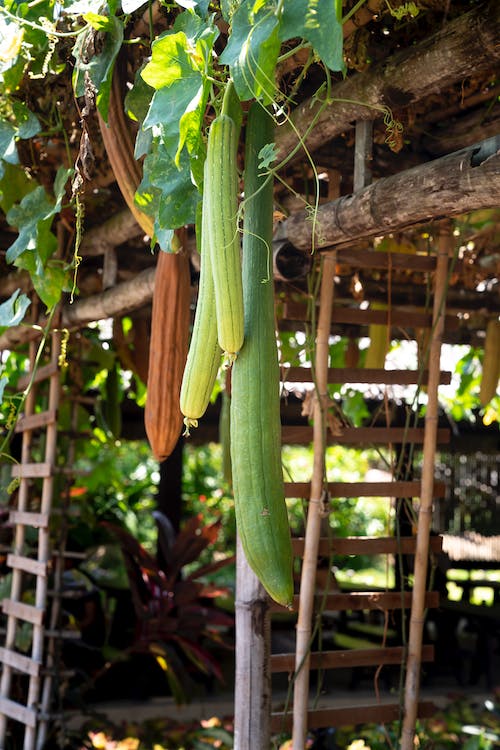These vegetable gardening tips will make all the difference to the health and quality of your home-grown food.
These days when we know that organic food is healthy but more expensive to buy, applying a few easy and commonsense tips can ensure that your crops grow strong and taste wonderful, fresh from your own garden. Even the humble potato is unbelievably delicious when you have grown it at home.
1) Situate Your Garden.
Ideally, your vegetable plots should be situated in the sunniest area of your garden. Not every-one has that option, especially if you want to cultivate a small garden in a town. Houses these days are thrown up facing any direction, and your garden may get a lot of sun (south-facing) or little (north-facing). But there is usually one area of any garden that does receive more sun than others. This is the best spot to site your vegetable garden. It is also handy to have it close to the kitchen so you can easily see what is ripening and just walk outside and pick it. A friend of mine says there is nothing better than picking a ripe tomato directly from her garden, and I would tend to agree.
2) Prepare the soil.
One of the most important vegetable gardening tips would be to add organic material or compost to the earth before planting. This encourages the worms, which in turn will help your soil immensely. Dig the soil when it is moist or dry, not when it is wet. Avoid walking on the earth, as this compacts it. Firm the soil with the back of a fork or spade. This should result in a rich, quite dark and crumbly soil, whatever the natural surface soil of your area. There is something special in crumbling that soil in your hands; a good clean loamy scent that makes you think of a bountiful crop.
In the case of container gardening – I tend to add manure to the soil at the end of the growing season once the plants have died back and mix it in. This gives it the entire winter to rot down and enrich the soil within the container ready for the new growing season.
3) Start planting early in the spring.
Soak your seeds to get a head start. Seeds need to drink up a lot of moisture before they germinate as if they are being rained on. Place the seeds in room temperature water for a few hours, or at the most overnight until they are plump and swollen, and ready to grow. Drain and plant immediately. Some vegetables such as tomatoes will benefit from being sown in trays on the windowsill, other, more hardy plants can be sown directly. If you decide to buy seedlings to plant, check that the roots are long, strong and well-branched, with healthy-looking leaves.
To foil the attacks of the cutworm, (moth caterpillar) who eat at the tender roots, push cardboard tubes down over the seedling, and about halfway into the earth around it. You can save the tubes from finished toilet rolls or cut kitchen roll tubes in half.
4) Make the most of your space.
If you want to plant a variety of vegetables or do not have much space, consider planting vertically rather than horizontally. beans, cucumbers, melons, and squashes can be trained to grow up a trellis instead of spreading over the ground. You can also save space by growing melons and cucumbers in a compost pile if you have one, or instead of a trellis use a tepee made of bean poles.
5) Extend your growing season.
Summer is not the only growing time. You can easily lengthen the productive time of your garden, growing kale, broccoli, ornamental cabbages, and leeks into the autumn. A layer of straw can be used as a cover to retain heat when the frosts come. When it comes to planting for the spring, autumn is the time to plant leafy green vegetables, leeks, and shallots among others to enjoy the next spring or early summer.
6) Know your weeds.
Other important vegetable gardening tips include pulling your weeds early when it is easier. Most weeds do not have deep roots, especially when they are young, and this is the time to nip them out, or chop them off at ground level, a process you may have to repeat several times, but the weed will die eventually, and this is far better than using toxic weedkiller, which should be used anywhere near vegetables. Organic mulches also discourage weeds.
Don’t forget that if your weeds are an edible or medicinal type like the stinging nettle or dandelions, then you might not want to get rid of them if you intend to use them.
There is no question, Gardening is a labor of love. It’s relaxing and healthy for both for the mind and body.
By implementing these vegetable gardening tips, your garden will be extra special, and you’ll be able to look forward to a delicious and nutritious harvest of healthy, home grown food.
We hope you enjoyed our vegetable gardening tips. This is a very BIG website with lots of other useful gardening related articles. Feel free to use the Google search box (upper right area of this page) to find articles on almost any gardening-related subject.

